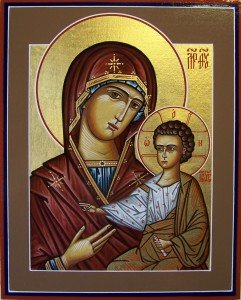 In this article I have been sharing thoughts about the Major Feasts of our Church and why they were established. In the last issue I began sharing thoughts about the feast of our Lord’s Ascension into heaven. As a feast concerned with the nature of Christ, the Ascension was potentially applicable to any controversy over that subject.
In this article I have been sharing thoughts about the Major Feasts of our Church and why they were established. In the last issue I began sharing thoughts about the feast of our Lord’s Ascension into heaven. As a feast concerned with the nature of Christ, the Ascension was potentially applicable to any controversy over that subject.
According to John of Damascus, the Nestorians credited Christ’s more humble actions to His humanity and His more noble actions to His divinity. They believed that only Christ’s separate human nature died and that it was only extrinsically united with His divine nature. Like Arianism, this was a threat to the true doctrine of salvation. Furthermore, the Nestorian denial of Mary’s title “God-bearer” (Theotokos) in favor of the more limiting “Christ-bearer” provoked intense and increasing opposition to Nestorianism from both right-believing theologians and adherents to the growing Marian devotion. Nestorianism was condemned in 430. Pope Celestine gave Nestorius ten days upon receipt of a papal letter to deny his earlier schismatic position and Cyril of Alexandria added 12 anathemas to which Nestorius was to subscribe. Nestorius refused and was condemned by the majority party at the Council of Ephesus in 431, which also affirmed Mary as Theotokos (Mother of God). Juvenal, bishop of Jerusalem (c. 420-458), had his see raised to the rank of patriarchate as a reward for his part in the proceedings.
The Nestorians believed that Christ’s human nature was incapable of the act of the Ascension without the Holy Spirit’s assistance. In fact, according to John Cassian (c. 360-435), they even falsified the account of the Ascension in Acts 1:1-11 so that Holy Scripture would seem to confirm this. Since the Council of Ephesus only condemned Nestorianism but did not eliminate it, resistance to the celebration of this feast by Nestorian bishops and communities may have been considerable in certain areas. So while Nestorianism’s troubled relationship with the “true and orthodox faith” (that confirmed by the Council’s of the Church) stimulated the growth of later feasts it seems to have inhibited the spread of the Feast of the Ascension.
Liturgical experts are of the opinion that the celebration of this feast only became universal in the fourth century. It was extolled by John Chrysostom, Gregory of Nyssa, Epiphany of Cyprus, Leo the Great and others. In the fourth century, Queen Helena erected a church in honor of this feast.
